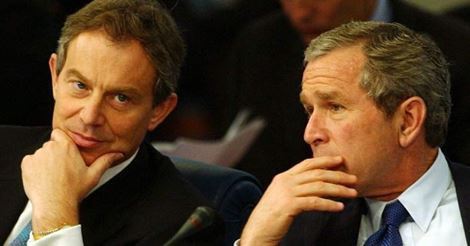I happened to notice that a week or so ago was the 10th anniversary of the death of the Labour MP and former British Foreign Secretary Robin Cook.
An apparently fit and healthy Mr Cook died in 2005 while walking on a remote Scottish mountainside, at the age of 59, and – according to the official statements – from a heart attack.
The local police’s statement after Cook’s death was a little iffy, to say the least; “As this would appear to be a medical matter,” we were told, “there is no further police involvement.”
And that was it – case closed, without a real investigation having been conducted.
Just as curious was the fact that the newspapers and news media didn’t seem particularly interested in investigating Cook’s death either and the matter seemed to be pushed to one side very quickly; which is odd when it concerns the death of a highly significant political figure and the man who had only very recently been the nation’s Foreign Secretary.
Robin Cook had died very suddenly, supposedly from a heart attack while on a countryside walk with his wife. But despite the media’s remarkably limited and unquestioning coverage of the matter, there were irregularities around the circumstances of Cook’s death. Cook was rushed to hospital by helicopter without his wife, who was not permitted to accompany him, even though he was still alive at that point.
The helicopter, according to newspaper reports, had taken 30 minutes to arrive at the scene. As her husband was flown off, Mrs Cook was left to walk all the way back down the Scottish mountainside on her own.
By the time she got to Raigmore Hospital in Inverness, her husband had already been pronounced dead. Gaynor Cook, his wife, has never spoken about the matter to this day, despite requests from various media organisations. The post-mortem took two days to decide whether Mr Cook “had died from an illness or injuries sustained in the fall”.
The cause of death eventually settled on was ‘hypertensive heart disease’.
We were told that neither Mr Cook or his wife were carrying mobile phones with them; which, though possible, seems odd, as this was only 2005 – not the early nineties.
There is also the matter of the unidentified group of ‘walkers’ who, according to official reporting, came to Gaynor Cook’s aid when her husband had collapsed in the highlands. Is is, however, noted by some that it would’ve been unusual for such people to be around the area of Ben Stack where Mr Cook had collapsed.
The landlady of Scourie Lodge, where Robin Cook and his wife had spent their final night together, had said at the time, “She was lucky another walker was in the area to be with her at such a time. You could be on Ben Stack ninety times and not see a soul, so for someone to be within shouting distance and with a mobile phone was very fortunate.”
Which leads us to wonder whether these unidentified people may have been there at that time for a more specific reason and whether they may have been something more than friendly passers-by.
Tony Blair, who was at that time still Prime Minister (and who had, some years earlier, demoted Cook to a lesser post for fear of Cook being a problem in regard to foreign policy), declined to attend Mr Cook’s funeral; the excuse given being that he was apparently busy with other matters at the time. It was Gordon Brown who gave the eulogy at Cook’s funeral service.

Cook (pictured on the right above), of course, had been one of the most ardent objectors to British involvement in the Iraq War. In fact he famously resigned from the Labour Party in protest over the decision to invade Iraq. “I have heard it said that Iraq has had not months but 12 years in which to complete disarmament and that our patience is exhausted,” Mr Cook had said at the time, “yet it is more than 30 years since Resolution 242 called on Israel to withdraw from the occupied territories. We do not express the same impatience with the persistent refusal of Israel to comply.”
He also later was open about his scepticism concerning the Al-Qaeda narrative. “There were no international terrorists in Iraq until we went in. It was we who created the conditions for Al-Qaeda to thrive,” he had said, refuting the idea that the US-led invasion had been aimed at ‘fighting terrorism’. He was correct, of course; there had been no terrorism coming from Iraq prior to 2003, no extremist groups active in Iraq prior to 2003, and Iraq had had absolutely no connection to 9/11.
Iraq, like Libya soon to follow, had been a stable, secular country until Western operations callously turned it into an Al-Qaeda/terrorist stronghold.
It was Robin Cook’s sense of ethics more than anything that had guided his protest against the Blair government’s war; that same sense of ethics had been present in much of Mr Cook’s political career.
He was an early supporter of constitutional and electoral reform, and a supporter of unilateral nuclear disarmament. Among other things, Cook was responsible for the agreement between Britain and Iran that ended the Iranian death threat against the author Salman Rushdie, helping Britain and Iran to improve diplomatic relations. He is also the man most credited with having helped convince Gaddafi-era Libya, after over eight years of resistance, to hand over the suspected Lockerbie bombers for a trial in the Netherlands (but crucially according to Scottish law).
This Libyan extradition of the Lockerbie suspects (who it turns out were probably innocent anyway) was a major reason that Libya and the West were able to ‘reconcile’ for those brief few years, with the Gaddafi government becoming a key ally in the so-called ‘War on Terror’.
His openly stated desire to add “an ethical dimension” to British foreign policy didn’t only see him falling out with the Blair government over the Iraq War; in March 1998, Israeli Prime Minister Benjamin Netanyahu angrily cancelled a dinner with Cook when the British Foreign Secretary did that rare thing (for a British politician) and openly criticised illegal Israeli settlement building in Palestinian territory.
–
–
His opposition to the Iraq War was one of the key themes in his widely acclaimed book, The Point of Departure, which, among other things, discussed in diary form his efforts to persuade his colleagues, including Tony Blair, to distance the Labour Government from the Geo-political agendas of the Neo-Con/Bush administration (obviously to no avail). Cook’s resignation speech in the House of Commons (video shown above – and notice Jeremy Corbyn on Cook’s right) received a standing ovation by fellow MPs, and it was described by the BBC’s Andrew Marr as “without doubt one of the most effective, brilliant resignation speeches in modern British politics.”
According to Cook’s obituary in The Economist, this had in fact been the first speech ever to receive a standing ovation in the history of the House, and it was a substantial embarrassment to the Blair government.
Summing up the character of the Iraq invasion, Mr Cook had said; “Ironically, it is only because Iraq’s military forces are so weak that we can even contemplate its invasion. Iraq probably has no weapons of mass destruction in the commonly understood sense of the term – namely a credible device capable of being delivered against a strategic city target. It probably still has biological toxins and battlefield chemical munitions, but it has had them since the 1980s when US companies sold Saddam anthrax agents and the then British Government approved chemical and munitions factories. Why is it now so urgent that we should take military action to disarm a military capacity that has been there for 20 years and which we helped to create?“
It was also Robin Cook who was willing to openly state, in 2005, that Al-Qaeda was little more than a long-held ‘database of mujahideen and fighters’, stating that the myth of a real terrorist network called ‘Al-Qaeda’ and led by Osama bin Laden was simply a fiction concocted and maintained by the CIA.

In a column for The Guardian just weeks before his death, he expressed that view; a view that has since been borne out absolutely by facts.
Al-Qaeda of course does exist now, but only due to a kind of self-fulfilled prophecy; but at that time, and the time of 9/11, it is very doubtful that the organisation existed as anything like the highly-organised ‘bogeyman’ it was being portrayed as. Robin Cook, and many other British politicians – in the Foreign Office at the very least – would’ve been well aware of that, and well aware of the fact that British intelligence had been working with Al-Qaeda affiliates for many years, for example in the ongoing operation in Libya to assassinate Gaddafi.
Liberal Democrat MP Norman Baker was among those who believe that Cook did not die of natural causes, but was the victim of an intelligence agency assassination.
If true, Mr Cook, like the weapons expert Dr David Kelly, might be seen as yet another domestic victim of the Iraq War conspiracy; a war that was carried out against the wishes of the British people, against the rules of international law, a war based on proven lies, a war that was entirely unnecessary, and a war that we are still all living with the consequences of.
The absolute lack of interest by virtually all of the mainstream media in looking into the death of Robin Cook remains very suspect, just like the lack of police interest at the time.
Then again, even should an investigation be carried out, it probably wouldn’t be a reliable one anyway – as anyone who studies the Diana inquest will find out for themselves.
That, in all likelihood, will also apply to the Chilcot Inquiry, which for all the interminable delays that have prevented its publication, is unlikely to accomplish very much.





Strange. I was just commenting elsewhere yesterday – on an academic paper with regard to ‘conspiracy theorists’ – that on the day this M.P. died, I was painting a bedroom and listened to the Radio 4 reports all day.
The circumstances of the ‘death’ kept changing throughout; I can’t remember exactly but it was along these lines: first he had gone up the hill with security guards whilst his wife waited at the bottom; then they had stayed at the bottom while he went up with his wife; then they weren’t there at all, and so on. I’ve never known such ‘inaccurate’ reporting on a matter: it plainly stank, like Dr Kelly’s ‘death’, when paramedics said that they found him with the stickers attached to him, the ones that you use to attach wires to a heart machine; later the paramedics withdrew this claim. The gov must think we’re stupid!
A retired friend of mine says that this has often been the case; stories changing as the day goes on with one bulletin contradicting another. Most of the public switch off; cognitive dissonance. They can’t be bothered to question it and presume they misheard, or they just don’t notice.
Even more cynically, perhaps the government allow these ‘half truths’ to emerge, so that those who do notice the deception get ‘the message’ regarding what can happen to even powerful people if they don’t tow the government line.
Thank you for such an interesting comment, sassonhan. The point you make about the contradiction in reporting is very interesting. This seems to happen a lot with big news events of this type, I’ve noticed. I recall it being the case in the reporting of Diana’s death, the 9/11 attacks, the 7/7 bombings, and so on.
But this ‘contradictory reporting’ usually occurs all in the first day or two of the event and then a sort of ‘consensus reporting’ emerges beyond that point. After a short amount of time, most people stop paying attention or they don’t really remember the inconsistencies from the first few days.
But your suggestion that maybe the half-truths are deliberately allowed to air so that people can ‘get the message’ is particularly interesting. Given the glaring lack of investigative journalism in the Robin Cook case, I tend to wonder if the media in general is in on that strategy too…
“Given the glaring lack of investigative journalism in the Robin Cook case, I tend to wonder if the media in general is in on that strategy too…”
Yes, I don’t think they have much choice to be honest. We can see this from all the ‘d notices’ that papers received over the historic CSA cases. Yet they will still allowed to print all of the Snowden stuff: why is that?!
I think the Snowden case proved more than anything, is that yes, the papers can print the truth sometimes – open the floodgates before anything can be done about it, then it’s too late for governments to deny things. With regard to Snowden however, it’s ended giving the security services a legalistic platform to continue doing everything they were doing before, and then some (In the US at the moment, they’ve supposedly stopped some of the privacy intrusions).
To think that a newspaper can print an article about a computer programme that the security services use, that can remotely place – for example – child abuse documents onto your hard-drive, manipulate your browsing history/sms messages/email etc, to make it look like you’re an abuser/terrorist/criminal, just to get you out of the way, is astounding. They can also section you, or put you under house arrest, ban you from using the internet, telephone etc: yes, the government have already been doing the things that are being implemented by Theresa May in the autumn. Really, no one who opposes authority is safe. If you oppose them too much, they can just take you down. I’ve seen this happen on Facebook Groups that have become infiltrated with people determined to stymie genuine members from helping people too much. This is not in the realm of conspiracy theory any more, rather it’s now conspiracy fact and widely documented (although hardly discussed in the MSM).
I actually think you’re quite brave to have written this article considering the subject! I wasn’t even going to mention Robin Cook’s name in the comment I made yesterday!
You’re the fourth or fifth person in the last few weeks to say I’m ‘brave’ for writing some of the stuff I’ve written – I’m actually starting to find it slightly unsettling, particularly as my computer has been behaving a little strangely the last few days.
Reblogged this on Britain Isn't Eating.